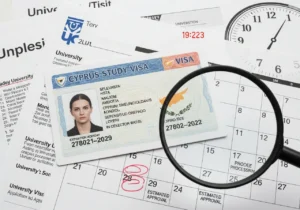
Cyprus Study Visa Cost 2025 | Sunland Education
Table of Contents Understanding Cyprus Study Visa Cost Overview Planning to study abroad requires careful financial planning and understanding all associated expenses. The cyprus study
![]()

Dreaming of pursuing higher education in Europe but worried about the IELTS requirement? You’re not alone. Thousands of Indian students face this challenge every year. The good news is that obtaining a study visa without IELTS in Europe is now more achievable than ever before. With over 20 years of experience helping students navigate international education pathways, I’ve witnessed firsthand how alternative English proficiency options have revolutionized European study opportunities. This comprehensive guide will walk you through everything you need to know about studying in Europe without the traditional IELTS barrier.
The landscape of European education has transformed significantly over the past decade. Many European universities and immigration authorities now recognize that study visa without IELTS in Europe applications can be equally valid when students provide alternative proof of English proficiency. This shift has opened doors for countless international students who excel academically but may not have taken the IELTS examination.
European countries understand that standardized testing isn’t always the best measure of a student’s ability to succeed in an English-medium academic environment. According to recent data, over 50,000 Indian students studied in Europe in 2024, with Germany alone admitting approximately 49,000 Indian students. The acceptance of alternatives to IELTS has contributed significantly to these impressive numbers.
European educational institutions focus on holistic assessment. They recognize that students who have completed their previous education in English-medium schools or colleges possess sufficient language skills. This practical approach has made Europe an increasingly attractive destination for international students seeking quality education without the stress of mandatory IELTS scores.
Several prestigious European nations welcome international students without requiring IELTS scores. Let me share insights from two decades of experience about which countries offer the most opportunities.
Germany stands out as a premier destination for students seeking study visa without IELTS in Europe. With its robust education system and numerous research opportunities, Germany offers many universities that accept Medium of Instruction certificates or alternative English proficiency tests. Popular institutions like the University of Siegen, University of Koblenz & Landau, and Esslingen University of Applied Sciences provide pathways for students without IELTS scores.
What makes Germany particularly attractive is its tuition-free education at public universities. Students only need to prove they have approximately €853 per month for living expenses. The country’s strong economy and demand for skilled professionals in IT, engineering, and healthcare sectors create excellent post-graduation opportunities.
France has become increasingly flexible regarding language requirements, especially at business schools and private institutions. Universities such as NEOMA Business School, PSB Paris School of Business, and SKEMA Business School accept alternatives to IELTS, including interviews or MOI certificates. France ranks 8th internationally among the best study destinations globally.
International students with valid student visas can work part-time up to 964 hours per year while studying in France, making it financially viable for many aspiring scholars.
Italian universities, including the prestigious University of Bologna and Polytechnic University of Milan, accept admissions based on prior English-medium education or alternative proof. Italy requires students to prove financial support of at least €448 per month for the duration of studies, making it one of the more affordable European destinations.
Poland has emerged as an increasingly popular choice for English-taught programs with flexible language requirements. Medical universities in Warsaw and Gdansk are particularly renowned for accepting students without IELTS, provided they meet other admission criteria.
Known for its international outlook, Dutch universities offer numerous English-taught programs without IELTS requirements. The University of Amsterdam, Leiden University, and Wageningen University accept prior English education certificates or alternative tests like TOEFL, PTE, or Duolingo.
Scandinavian nations have public universities that sometimes waive IELTS requirements, particularly for students with English-medium educational backgrounds. Uppsala University in Sweden and various Norwegian institutions accept MOI certificates or alternative proof of English proficiency.
Understanding which tests European universities accept is crucial for students planning to pursue study visa without IELTS in Europe. Based on my 20 years of experience in international education consulting, here are the most widely accepted alternatives.
TOEFL iBT is accepted across most European universities. The minimum score requirement typically ranges from 90 to 100, though specific programs may require higher scores. Universities in Germany, Netherlands, France, and the UK readily accept TOEFL as proof of English proficiency. The test evaluates reading, listening, speaking, and writing skills through an internet-based format.
PTE Academic has gained significant recognition across Europe. Countries including the UK, Ireland, Germany, France, Netherlands, Spain, and Italy accept PTE scores. Most undergraduate and postgraduate programs require scores between 59-65, with specialized programs like Medicine and Law demanding higher scores. Top universities such as Trinity College Dublin, University of Essex, and Technical University of Munich accept PTE scores.
The Duolingo English Test has seen remarkable growth, with 489 universities and programs across Europe accepting it as of 2024. This online, affordable test (USD 59) delivers results within 48 hours, making it ideal for students with tight deadlines. Trinity College Dublin (requiring 115-120), University of Glasgow (110-115), and Jacobs University Bremen (105-110) are among prestigious institutions accepting Duolingo scores.
The test is now accepted in 23 European countries, including the UK, Ireland, Germany, France, Netherlands, Spain, Italy, Poland, Portugal, Sweden, Norway, and Switzerland.
The Medium of Instruction (MOI) certificate has become a game-changer for students seeking study visa without IELTS in Europe. This official document from your previous educational institution confirms that your classes were conducted in English, serving as proof of English language proficiency.
An MOI certificate offers several advantages over standardized tests. First, it’s usually faster to obtain and involves little to no cost compared to expensive examination fees. Second, it eliminates test-taking anxiety and performance pressure. Third, it remains valid as long as universities accept it, unlike IELTS or TOEFL scores that typically expire after two years.
The process is straightforward. Visit the examination or administrative office of your college or university and request the MOI application form. Submit necessary documents including academic transcripts and proof of identity. Processing typically takes 1-3 weeks. The certificate should be issued on institutional letterhead with official seal, signature, and date.
A reliable MOI certificate must contain your full name, course details, duration of study, and a clear statement that English was the primary medium of instruction throughout your education. It should also include institutional contact information for verification purposes.
Several European countries and their universities accept MOI certificates. In the United Kingdom, institutions like the University of South Wales, University of Hertfordshire, and Cardiff Metropolitan University recognize MOI. Irish universities including Dublin City University offer alternative pathways with MOI acceptance. German institutions such as University of Kassel and Hochschule Bremen accept MOI for English-taught programs.
Countries like Austria, with universities such as the University of Vienna and Graz University of Technology, also recognize MOI for select programs. However, it’s crucial to verify current policies with specific departments as requirements may vary.
Pursuing higher education through study visa without IELTS in Europe pathways offers numerous advantages that extend beyond simply avoiding a standardized test.
European institutions consistently rank among the world’s best universities, offering rigorous curricula and high academic standards. Universities like Oxford, Cambridge, Munich, Copenhagen, and the Sorbonne have centuries of academic excellence. What’s remarkable is that many European countries, particularly Germany, offer tuition-free education at public universities, making quality education accessible to international students.
Compared to countries like the USA and Australia, European education is significantly more affordable. Some countries have minimal or no tuition fees, and numerous scholarship opportunities further reduce financial burden.
Europe offers unparalleled cultural immersion. From Rome’s ancient ruins to London’s modern metropolis, students experience diverse languages, customs, and lifestyles. Historical landmarks like the Acropolis, Colosseum, and Eiffel Tower provide constant learning opportunities outside the classroom.
This exposure to different cultures enriches personal development and broadens global perspectives. Cities like Paris, Berlin, Amsterdam, and Vienna combine world-class architecture with vibrant student life.
European countries permit international students to work part-time during studies, typically up to 20 hours per week. The booming European economy offers well-paid jobs, particularly in sectors like technology, engineering, healthcare, and business.
Many countries offer Post-Study Work Visas, allowing graduates to gain professional experience. Germany’s EU Blue Card, for instance, can lead to permanent residency in just 2-3 years. Luxembourg offers the highest minimum wage in Europe at €3,085 per month, creating lucrative opportunities for skilled graduates.
Europe’s linguistic diversity allows students to learn multiple languages. Many universities offer free language courses, and being multilingual becomes a tremendous career advantage globally. While English serves as a common language, learning French, German, Spanish, or Italian opens additional professional doors.
Europe’s compact geography makes travel incredibly accessible. Student visas facilitate hassle-free travel across multiple countries. The euro currency used by most European nations simplifies financial transactions while exploring different cultures and destinations during weekends and holidays.
European university degrees are highly valued worldwide, enhancing career prospects globally. The quality of education, combined with international exposure and multicultural competencies, makes graduates highly competitive in the global job market.
Navigating the complex process of securing study visa without IELTS in Europe requires expert guidance. As specialized Europe visa consultants in Chandigarh, Sunland Education and Immigration Consultant Chandigarh has been serving students for over 23 years, establishing itself as a trusted Europe immigration agency in Chandigarh.
Expert counselors at Sunland Education and Immigration Consultant Chandigarh conduct thorough profile assessments to understand each student’s academic background, career goals, and financial situation. This personalized approach ensures students receive advice tailored to their specific circumstances, maximizing chances of success.
With extensive knowledge of European universities accepting alternatives to IELTS, the experienced team helps students identify the most suitable institutions and programs. They provide detailed information about admission requirements, application deadlines, and program offerings across countries like Germany, France, Italy, Netherlands, Sweden, and beyond.
One of the most critical aspects of visa applications is proper documentation. The professional team assists with preparing all necessary documents, including MOI certificates, academic transcripts, financial statements, and motivation letters. They ensure every document meets embassy standards, significantly reducing rejection risks.
Sunland Education and Immigration Consultant Chandigarh handles complete visa application filing, schedules appointments for biometrics or interviews, and follows up with consulates to track application status. For countries requiring visa interviews, they provide mock sessions and valuable tips to help students respond confidently.
Beyond visa approval, the consultancy offers pre-departure orientation, helping students understand what to expect in their new country. From accommodation arrangements to understanding local culture and regulations, comprehensive support ensures smooth transitions.
With offices conveniently located at SCO-260, Sector 32-D, Chandigarh, Sunland Education and Immigration Consultant Chandigarh has helped thousands of students achieve their European education dreams. Their transparent approach, experienced staff, and proven track record make them one of the most reliable Europe visa consultants in Chandigarh.
Successfully obtaining study visa without IELTS in Europe requires careful planning and systematic execution. Here’s a comprehensive roadmap based on two decades of expertise in international education.
Begin by identifying which European country and specific universities align with your academic goals and budget. Consider factors like program offerings, language of instruction, tuition fees, cost of living, and post-graduation work opportunities. Countries like Germany offer tuition-free education, while others may have varying fee structures.
Each university has unique admission criteria. Carefully review whether they accept MOI certificates, Duolingo, TOEFL, or PTE scores instead of IELTS. Visit official university websites or contact admissions offices directly for current requirements, as policies can change.
If pursuing the MOI certificate route, request it from your previous institution immediately, as processing can take 1-3 weeks. Alternatively, register for and complete accepted alternative tests like Duolingo (48-hour results), PTE, or TOEFL well before application deadlines.
Compile all academic transcripts, diplomas, and certificates from previous education. Many universities require these documents to be translated into English by certified translators and attested by relevant authorities.
Prove you have sufficient funds to cover tuition and living expenses. Requirements vary by country—Germany requires approximately €11,208 annually (€934 monthly) in a blocked account, while Italy requires proof of €448 monthly. Bank statements, scholarship letters, or sponsor declarations serve as proof.
Most European universities have specific application windows. Fall intake applications typically close between January and July, depending on the country. Some countries like Sweden and Finland have earlier deadlines (January), while Germany and Poland accept applications until later (July-August).
Submit complete applications through university portals or centralized systems like Uni-Assist (Germany) or Studielink (Netherlands). Pay attention to application fees and deadlines.
Upon acceptance, universities issue conditional or unconditional offer letters. Conditional offers may require you to meet additional criteria before final admission. Pay the tuition deposit to secure your place.
With your admission letter in hand, begin the visa application process at the embassy or consulate of your destination country. Apply at least 3-6 months before your course start date, as processing typically takes 2-6 months.
Some countries require visa interviews. Prepare thoroughly by reviewing your application, understanding your study plans, and demonstrating genuine intent to return home after studies. Expert consultants can provide valuable mock interview sessions.
Once your visa is approved, book flights and arrange accommodation. Many universities offer student housing, or you can explore private rentals. Prepare for your journey by researching local culture, weather, and essential items to pack.
Success in obtaining study visa without IELTS in Europe depends significantly on proper documentation. Here’s a comprehensive checklist based on 20 years of consulting experience.
A valid passport with at least 12 months validity beyond your planned return date and sufficient blank pages for visa stamps is fundamental. Include photocopies of the passport data page. Recent passport-sized photographs meeting specific embassy requirements (usually 3-5 photos) are necessary.
The university acceptance letter or admission confirmation serves as proof of enrollment. A completed visa application form, accurately filled without discrepancies, is mandatory. Any errors between your form and supporting documents can lead to rejection.
Instead of IELTS, submit your MOI certificate from your previous educational institution, or alternative test scores like TOEFL (typically 90-100), PTE Academic (59-65), or Duolingo English Test (105-120, depending on the university). Some universities also accept internal English assessments or interviews.
Proof of sufficient funds varies by country but generally includes bank statements from the last 3-6 months showing adequate balance, scholarship or stipend confirmation letters, or formal sponsorship letters from parents or guardians with their financial documents. Some countries like Germany require opening a blocked account with specific minimum amounts.
Submit all academic transcripts, diplomas, and degree certificates from previous studies. These may need certified translations if originally in languages other than English. Some programs require specific prerequisite courses or minimum grade requirements.
A motivation letter or Statement of Purpose explaining your study goals, career plans, and why you chose this particular program and country is crucial. Letters of recommendation from professors or employers strengthen your application. Proof of accommodation—whether university dormitory confirmation or private rental agreements—is required.
Comprehensive health insurance coverage meeting European standards (typically covering at least €30,000 in medical expenses) is mandatory. A police clearance certificate or criminal background check from your home country may be required. Some countries also require medical certificates or tuberculosis test results.
Germany requires proof of a blocked account (Sperrkonto) with approximately €11,208. France requires applicants to complete the Campus France procedure. Italy demands pre-enrollment at Italian consulates. Spain may require specific forms or declarations. Always check embassy websites for updated country-specific requirements.
Through two decades of consulting experience, I’ve observed recurring mistakes that lead to visa rejections. Avoiding these pitfalls significantly improves your chances of successfully obtaining study visa without IELTS in Europe.
The most common reason for visa rejection is incomplete documentation or discrepancies between application forms and supporting documents. Double-check that every required document is included, properly formatted, and accurately reflects your information. Even minor spelling errors in names or incorrect dates can raise red flags.
Many students underestimate processing times. Visa applications can take 2-6 months, and appointment slots at embassies fill quickly, especially before academic session starts. Starting the process at least 3-6 months before your course begins ensures adequate time for any unexpected delays or additional document requests.
Failing to demonstrate adequate financial resources is a major rejection cause. Simply showing a one-time deposit into your account raises suspicions. Maintain consistent balances over several months, and ensure funds meet the specific minimum requirements of your destination country. If using a sponsor, provide comprehensive documentation of their financial stability and relationship to you.
Not all universities within a country have identical admission policies. Some departments within the same institution may have different English proficiency requirements. Always verify specific requirements with the exact program you’re applying to rather than assuming general country-level information applies.
For countries requiring interviews, appearing unprepared or providing inconsistent answers raises doubts about your genuine intent. Practice common interview questions, understand your chosen program thoroughly, and clearly articulate your study and career plans. Never memorize scripted answers—authenticity is crucial.
Applying for courses that don’t align with your previous academic background or career trajectory can lead to rejection. For instance, if you studied commerce but suddenly apply for engineering without clear justification, visa officers may question your intentions.
While you’re pursuing study visa without IELTS in Europe, completely ignoring language preparation is unwise. Some basic knowledge of the local language (German, French, Italian, etc.) demonstrates serious intent to integrate and can positively influence visa decisions, even if your program is in English.
Engaging inexperienced or fraudulent consultants can be catastrophic. Work only with established, reputable Europe visa consultants in Chandigarh like Sunland Education and Immigration Consultant Chandigarh, which has proven track records and transparent processes.
Over my 20-year career in international education consulting, I’ve witnessed countless students successfully pursue study visa without IELTS in Europe and build remarkable careers. Their journeys offer valuable lessons and inspiration.
One memorable case involved a student from Punjab who had excellent academic credentials but struggled with IELTS speaking sections despite multiple attempts. By obtaining an MOI certificate from his English-medium engineering college and working with Sunland Education and Immigration Consultant Chandigarh, he successfully gained admission to Technical University of Munich without IELTS. Today, he works for a leading German automotive company and is on track for permanent residency through the EU Blue Card program.
A commerce graduate from Chandigarh dreamed of studying luxury brand management in France but found IELTS preparation overwhelming while working full-time. She took the Duolingo English Test, scored 125, and applied to NEOMA Business School through proper guidance from experienced Europe immigration agency in Chandigarh consultants. Her application was successful, and she now works for a prestigious fashion house in Paris.
A student aspiring to become a doctor faced financial constraints that made repeated IELTS attempts impractical. Research revealed that Medical University of Warsaw accepted MOI certificates. With comprehensive support from Europe visa consultants in Chandigarh, he prepared all documentation perfectly and received his visa without ever taking IELTS. He’s now in his final year of medical studies with excellent prospects.
Several patterns emerge from successful applications. First, starting early is non-negotiable—students who begin preparations 8-12 months before their intended start date have significantly higher success rates. Second, honesty and consistency across all documents and interviews are paramount. Third, thorough research about specific university requirements prevents wasted effort on applications to institutions that don’t actually accept your alternative qualifications.
Professional guidance makes an enormous difference. While independent research is possible, navigating the complexities of different countries’ requirements, university policies, and visa procedures becomes far more manageable with expert consultants. The investment in professional services often pays for itself through avoiding costly mistakes and rejected applications.
Successful students emphasize the importance of maintaining organized documentation from the start of the process. They recommend creating digital and physical folders for each university application with all required documents clearly labeled. Many also stress the value of connecting with current students or alumni from target universities through social media or university forums—their firsthand insights prove invaluable.
Finally, flexibility improves outcomes. Students willing to consider multiple countries or programs rather than fixating on a single option have better chances of acceptance. The European higher education landscape offers tremendous diversity, and often excellent alternatives exist that students hadn’t initially considered.
Pursuing study visa without IELTS in Europe is not only possible but increasingly common as European universities recognize diverse measures of English proficiency. With options including MOI certificates, Duolingo, TOEFL, and PTE, the path to European education has become more accessible than ever before.
Europe offers unparalleled advantages—world-class education, often at minimal cost, rich cultural experiences, excellent career opportunities, and the chance to develop global perspectives that last a lifetime. Countries like Germany, France, Italy, Netherlands, Poland, and the Nordic nations welcome international students through flexible admission processes.
However, success requires careful planning, thorough research, proper documentation, and ideally, expert guidance from trusted consultants. As a seasoned professional with 20 years in international education, I cannot overstate the value of working with established Europe visa consultants in Chandigarh like Sunland Education and Immigration Consultant Chandigarh, who understand the nuances of each country’s requirements and can navigate complex processes efficiently.
The journey to European education begins with a single step—researching your options, understanding requirements, and taking action. Don’t let IELTS concerns hold you back from pursuing your academic dreams. Alternative pathways exist, and with proper preparation and guidance, you can successfully secure your place at a European university.
Your future awaits in Europe’s historic universities and innovative institutions. The combination of quality education, cultural enrichment, and career opportunities makes this investment in your future truly transformative.
Have questions about obtaining study visa without IELTS in Europe? Wondering which universities might be the best fit for your academic background? Curious about how Sunland Education and Immigration Consultant Chandigarh can simplify your application process?
We’d love to hear from you! Share your thoughts, questions, or experiences in the comments below. Your insights could help fellow students navigating similar paths. If you found this guide helpful, please share it with friends and family who might benefit from this information.
Connect with experienced Europe immigration agency in Chandigarh professionals today and take the first step toward your European education dream. Remember, every successful journey begins with proper guidance and determination—and you have both within reach.
Share this comprehensive guide with aspiring students in your network, and let’s help more deserving candidates access world-class European education without IELTS barriers!

Table of Contents Understanding Cyprus Study Visa Cost Overview Planning to study abroad requires careful financial planning and understanding all associated expenses. The cyprus study
![]()

Table of Contents Cyprus Study Visa Processing Time: Complete 2025 Guide Studying abroad has become an increasingly popular choice for Indian students seeking quality education
![]()

Table of Contents Introduction When preparing for the PTE Academic exam, one critical factor separates successful candidates from those who struggle: best PTE mock test
![]()

Table of Contents Dreaming of pursuing higher education in Europe but worried about the IELTS requirement? You’re not alone. Thousands of Indian students face this
![]()

Table of Contents UK Visa Application: Your Complete Guide for 2025 Applying for a UK visa application can feel overwhelming, especially when you’re navigating complex
![]()

Table of Contents Canada Immi Chandigarh: Your Trusted Partner for Canadian Immigration Success Navigating the complex landscape of Canadian immigration requires expertise, dedication, and a
![]()

Table of Contents Pursuing higher education abroad represents one of the most transformative decisions you’ll make in your academic career. However, navigating the complex world
![]()

Table of Contents Introduction: Why the Best & Top Immigration Consultant Chandigarh Matters Navigating the complexities of international visas and migration is challenging. That’s why
![]()

Table of Contents The journey to international opportunities begins with choosing the right guidance, and top visa consultants chandigarh have established themselves as North India’s
![]()

Table of Contents Finding the best visa consultants in Chandigarh can make the difference between visa approval and disappointment. With India’s visa applications reaching a
![]()
Welcome to Sunland Education & Immigration Consultants, Chandigarh (SEIC) which are serving in immigration field from last 23 years .

Copyrights © Sunland Immigration 2025